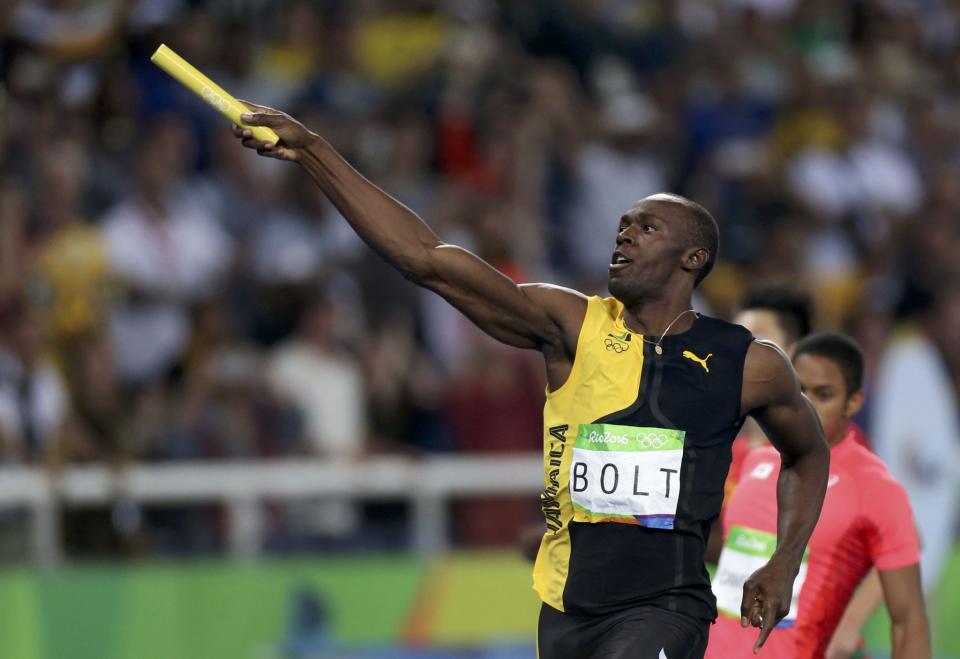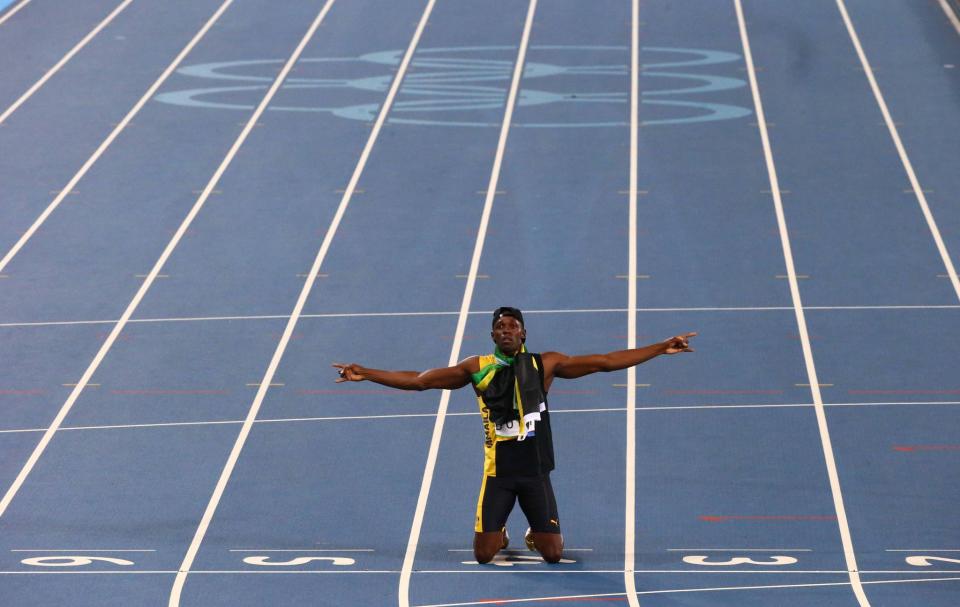The future of Usain Bolt is up in the air, but the present is as golden as ever
Medal count | Olympic schedule | Olympic news
RIO DE JANEIRO – At 1:19 a.m. Saturday, a roomful of runners broke into a boisterous version of “Happy Birthday to You.” While Usain Bolt doesn’t turn 30 until Sunday, there was no better time to fete him than deep into the night he ran his last race on an Olympic track. Or at least that’s what he says. Outside the room, waiting with a surprise gift, was his manager, Nugent “NJ” Walker. He held a remarkably realistic Bolt doll, its right knee lifted, its left arm cocked back, with a white 8½-by-11 sheet of paper taped to its outstretched right arm. The front of the paper wished Bolt happy birthday. And on the back were the words every person who witnesses Bolt’s greatness hopes come true.
SEE YOU IN JAPAN
The doll was a gift from a fan, and Walker tucked into the closed-access room before it could be ascertained whether it was a nod-and-wink joke or some sliver of hope that the fastest man in history, the one who won his ninth Olympic gold medal Friday night, the bright and shining star of these Rio Games just as he was in London and Beijing, might actually consider returning for the Tokyo Games in 2020.
If not – and Bolt insists he won’t – his sendoff at Olympic Stadium proved a satisfying conclusion to one of the great careers in sports history. He anchored Jamaica’s 4×100-meter relay team that conquered one lap in 37.27 seconds. Moments after crossing the finish line ahead of silver medalist Japan, a United States team that later was disqualified and eventual bronze medalist Canada, Bolt extended the right arm in which he held the gold baton, switched it to his left hand and made an OK sign with his right.

Things were more than OK. Coming into the Rio Games, Bolt yearned to cap his career with the so-called triple-triple – three gold medals in the same three events in three consecutive Olympics. He won the 100-meter dash in 2008, 2012 and 2016. He won the 200-meter dash in 2008, 2012 and 2016. And now he had won the 4×100 in 2008, 2012 and 2016. Eventually, Bolt wound his way over to the third lane, which bore a large No. 3. Bolt bent over and kissed it, imprinting on the track’s blue asphalt his lips as he had the Rio Games his supremacy.
“Nothing is impossible,” Bolt said. “I never set limits for myself. I’ve always wanted to push the barriers, and that’s what I did. I pushed the barrier and accomplished what I wanted to. That’s a joy. I’m happy.”
And so, presumably, off he coasts toward retirement, with only the 100 on his docket next year and beyond that a blank slate. Elite sprinters understand the finite nature of their careers, and perhaps better than anyone, Bolt calibrated his. He wins. This is who he is. This is what he is. In his last nine Olympic races, he came away with nine gold medals, putting him second all-time behind Michael Phelps among all Olympians. Friday ended like it was supposed to, with another gold medal, another breathtaking run, another reminder that Usain Bolt isn’t just the fastest man ever but one capable of summoning his otherworldly skill at the most appropriate time. There are great athletes, and there are great competitors, and there are the rarest breeds, of which Bolt is one, who manage to marry the two. They’re the ones that make history.

Bolt’s self-awareness rates among his best qualities, in that he understands his legacy is invincibility. He is the man who couldn’t lose, and while it’s difficult to burnish his sheen to a glossier version of himself than the one on whom the spotlight shines eternally, a successful return engagement in Tokyo might do it. Failure, on the other hand – and even a silver or bronze medal would constitute as much for Midas reincarnate – would not tarnish anything so much as assign to it an asterisk. There was Bolt, and there was Bolt*, like there was Willie Mays, and there was Willie Mays*.
This Bolt leaves unblemished, his pure preeminence undisputable. The way he took the baton from Yohan Blake in his left hand, switched it to his right and pulled away from Japanese anchor Aska Cambridge like a jet outrunning a car on a runway compressed all the glory of Bolt into less than 10 seconds. For nearly half a year, the Japanese team had focused on this relay as its best opportunity to medal, putting in untold practice time in hopes of running it perfectly. Jamaica needed no such rehearsals. When asked about their preparation, Jamaica’s Asafa Powell said: “Not much. I think Usain did one session, and we all did two sessions for the entire year.”
It shouldn’t be this easy, and it is, and for that any other team would invite villainy. This is Bolt’s Jamaica, though, and he’s impossible to dislike. It wasn’t just his teammates and Olympic volunteers partaking of the birthday wishes. It was everyone in the room, even the men Bolt had relegated to second and third place.

Everyone recognized the momentous nature of this night. Nine gold medals. It is staggering for a sprinter, but then Bolt isn’t just a sprinter. He’s a force of nature, arguably the greatest Olympian of all time, certainly the greatest showman. His last Olympic lap celebrated another victory, flag around neck, hands pointed in the air intermittently, Powell and Blake and Nickel Ashmeade all making sure to stay behind Bolt. They understood the pecking order.
Now comes life after Bolt, not just for Jamaica but the whole sport of track, which milked every last ounce of relevance out of him. Nobody wants Bolt in Tokyo more than the International Olympic Committee, and one member of Jamaica’s National Organizing Committee didn’t fully discount the possibility, saying ultimately the decision will fall on Glen Mills, the coach in whom Bolt places some of his deepest trust. If Mills says Bolt can win in Tokyo, Bolt will win in Tokyo.
That’s four years off, though, and four years is a long enough time that Bolt soaked in the huzzahs of the Rio crowd like they were his last in an Olympic venue. He pointed at fans and made exaggerated faces and acted like a man doing this for the final time. After he worked his way around the track, he stood near the medal podium and posed for pictures with his teammates. Powell’s shoes were bright red, Blake and Ashmeade’s white. Usain Bolt’s, as they deserved to be, were gold.
More Olympics coverage from Yahoo Sports:

 Yahoo Sports
Yahoo Sports 

